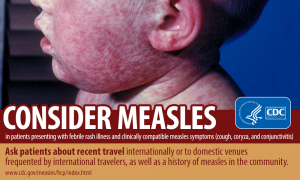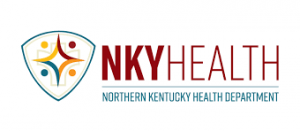With vaccine preventable diseases on the rise in the city of Cincinnati, and the continued increase in measles cases across the U.S., NKY Health joins other regional health officials to remind the public of the importance of staying up-to-date on vaccinations.
Northern Kentucky has not identified any measles cases at this time, but Kentucky has had two confirmed measles cases since January 2019. These cases occurred among unvaccinated family members that had recently traveled to a country where measles is more common.
Measles is a highly contagious respiratory disease caused by a virus. Vaccination with the measles, mumps and rubella vaccine, also known as MMR, is the most effective way to prevent transmission. Ninety-three percent of people who receive a single dose of MMR will develop immunity to measles, and 97 percent will be protected after receiving a second dose.
According to NKY Health’s District Director of Health, Lynne Saddler, MD, MPH, “Now is a good time to talk to your health care provider about whether or not you are protected against measles, and if you need the measles vaccine. This is important not only for children returning to school, but adults as well.”
The CDC recommends the following groups get the MMR vaccine:
•Children at 12 to 15 months of age (6 to 11 months if travelling internationally) and again at 4 to 6 years of age
•Adults considered at “high risk,” including health care and child care personnel, college students, women of childbearing age, and international travelers who do not have evidence of immunity from a health care provider
•Adults who received the measles vaccine between 1963 and 1967. Those vaccinated during this time frame are not considered immune if they received the killed measles vaccine.
If you’re unsure, talk to your health care provider. The MMR vaccine is safe, and there is no harm in getting another dose if you may already be immune to measles, mumps or rubella.
Measles is easily transmitted from person-to-person. When an infected person sneezes or coughs, droplets spray into the air. Those droplets remain contagious in the air and on surfaces for up to two hours. Additionally, someone with measles can expose and infect others before they feel sick.
Measles begins with a high fever, cough, runny nose, rash and red eyes about 7 to 10 days after exposure. Serious complications from measles can develop, such as pneumonia, encephalitis and death. Certain groups of people are more likely to suffer these complications.
For more information on measles vaccination, please visit the CDC’s website.
The Northern Kentucky Health Department provides public health services to more than 400,000 residents of Boone, Campbell, Grant and Kenton Counties, with a goal of preventing disease, promoting wellness and protecting against health threats. For more information, visit www.nkyhealth.org.
Northern Kentucky Health Department


















